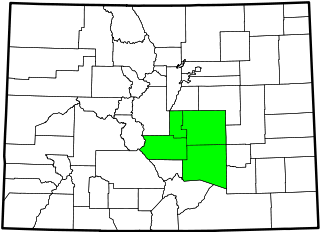See also
- Rama (disambiguation)
- Ramoth (disambiguation)
- Rameh, on Pierre Jacotin's 1799 map as "Ramah"
Ramah may refer to:
Lincoln most commonly refers to:
An alameda is a street or path lined with trees and may refer to:
Pittsburg may refer to:

The town of Ramah is a Statutory Town in El Paso County, Colorado, United States. The population was 123 as of the 2010 census. According to tradition, the name is derived from India.

Ouray is a home rule municipality that is the county seat of Ouray County, Colorado, United States. The city population was 1,000 as of the 2010 census. The Ouray Post Office has the ZIP Code 81427. Ouray's climate, natural alpine environment, and scenery have earned it the nickname "Switzerland of America".

Ramah is a census-designated place (CDP) in McKinley County, New Mexico. The population was 407 at the time of 2000 census and 370 at the 2010 United States Census.
Grant or Grants may refer to:
Colfax may refer to:
Stanley may refer to:
Dexter may refer to:
Guadalupe or Guadeloupe may refer to:

The Territory of Colorado was an organized incorporated territory of the United States that existed from February 28, 1861, until August 1, 1876, when it was admitted to the Union as the State of Colorado.
New York most commonly refers to:

Camp Ramah is a network of Jewish summer camps affiliated with the Conservative Movement. The camps operate in the United States, Canada, and Israel. All Ramah camps serve kosher food and are Shabbat-observant.

The South Central Colorado Urban Area comprises the Colorado Springs Metropolitan Statistical Area, the Pueblo Metropolitan Statistical Area, and the Cañon City Micropolitan Statistical Area in the central and south central region of the State of Colorado. With the exception of northern Teller County and small portions of northern El Paso County, the entire South Central Colorado Urban Area is drained by the Arkansas River and its tributaries. The South Central Colorado Urban Area is the southernmost of the three primary subregions of the Front Range Urban Corridor.

Deckers is an unincorporated community along the South Platte River in Douglas County, Colorado, United States. Stephen Decker built a general store here in the 1890s. He later added a saloon and called the settlement "Daffodil." The presence of natural springs led him to establish Deckers Mineral Springs and Resort in the popular region for fly-fishing. Deckers received national attention for the June 2002 forest fire, known as the Hayman Fire, which burned thousands of acres on the outskirts of the Denver metro area. The U.S. Post Office at Sedalia now serves Deckers postal addresses.

Rameh is an Arab town in the Northern District of Israel. Located east of Nahf and Karmiel, in 2019 it had a population of 7,728. Over half of the inhabitants are Christians, mostly Greek Orthodox and Greek Catholic, over a third are Druze and the remainder are Muslims.
Dallas is the ninth-most populous city in the United States and the third-most populous in the state of Texas.
Fort Lyon may refer to:

2 Kings 8 is the eighth chapter of the second part of the Books of Kings in the Hebrew Bible or the Second Book of Kings in the Old Testament of the Christian Bible. The book is a compilation of various annals recording the acts of the kings of Israel and Judah by a Deuteronomic compiler in the seventh century BCE, with a supplement added in the sixth century BCE. This chapter records Elisha's acts in helping the family of Shunammite woman to escape famine, then to gain back their land and in contributing to Hazael's ascension to the throne of Syria (Aram) in verses 7–15; then subsequently records the reigns of Joram and Ahaziah, the kings of Judah.